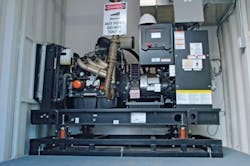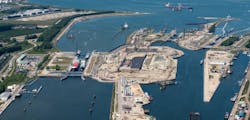PERC Op-Ed: CHP Systems Provide Unbeatable Resiliency for Dependable Operation
(Editor's Note: This is an opinion piece from the Propane Education and Research Council. It is running in the wake of Hurricanes Fiona and Ian, which again highlighted needs for on-site and islandable microgrids and CHP power plants. Friday is PERC's first-ever Propane Day).
---
In 2017, Hurricane Maria ravaged Puerto Rico, leaving millions of people in crisis. Electricity was cut off to the entire island, and access to clean water and food was very limited. It took almost a year to fully restore power, and in August 2018, the Puerto Rico Electric Power Authority (PREPA) announced that it had finally reconnected customers to the power grid, ending the longest blackout in U.S. history and the second-longest blackout in the world. Now, in 2022, propane has helped Puerto Rico again after Hurricane Fiona left the area in disarray once again.
“Propane is playing a critical role as communities in Puerto Rico recover from the storm,” said Bryan Cordill, director of residential and commercial business development for the Propane Education & Research Council (PERC). “With electricity unavailable in many areas, propane-powered CHP units and standby generators are playing a vital role in getting the island back on its feet."
Empire Gas, located in San Juan, Puerto Rico has supplied propane to homes and businesses since 1967. Founded by Ramón Gonzalez Cordero and Ketty Simounet Bey, Empire Gas is the largest propane supplier on the island.
Empire Gas is helping stabilize the community with propane-powered CHP units. These systems offer an energy solution that’s affordable, reliable, and won’t go down with the electric grid. Here are the benefits of being prepared with propane:
Increased Efficiency
CHP systems use a propane-powered engine, a heat exchanger, and a generator to create electricity that powers a building. Simultaneously, the heat from the unit is captured by the heat exchanger and used to channel thermal energy to applications like space heating, water heating, and dehumidification, to name a few. Using both the electrical and thermal output of the propane CHP system achieves system efficiencies as high as 75 percent.
Reliable & Convenient
Available in a wide range of capacities, CHP systems are well-suited for single-family homes, apartment buildings, small businesses, utility power, and large commercial and industrial applications. For example, 1-3 kW units are ideal for 1,800-2,500 square foot single-family homes. Units that range from 3-10 kW work well for single-family homes with greater heating loads (like pool heating) and multi-family commercial and light industrial applications, and 10-50 kW units can power residential apartment buildings and commercial buildings (like restaurants).
Related stories
Propane-fueled CHP system kept Puerto Rico Resort powered up during Hurricane Fiona
Can Propane-powered Forklifts help Decarbonize Warehouses and Factories?
Propane-powered CHP systems offer advantages that other fuel sources simply can’t match, making propane the natural choice. They offer quiet power, efficiency, safety, and dependability. With propane, you don’t have to worry. You control your energy storage with the propane you have on site.
Lower Emissions
Propane is cleaner than its diesel and gasoline counterparts. It is non-toxic, non-poisonous, and won’t contaminate soil or water. It also produces fewer emissions, according to data from the DOE, propane produces 16 percent fewer carbon emissions per unit of energy compared with diesel.
Enhanced Resiliency
As commercial buildings are experiencing more and more unplanned power outages, its causing incredible strain on an already fragile electrical grid.
CHP systems are ideal if on-site power generation has become a high priority, as most systems can be used for standby power during grid-based power outages. Because the unit runs on propane, and many units can start without power from the grid, it offers resilience and energy independence in the event of a power outage without the need for a standby generator.
Propane enables customers to take control of their energy storage. With propane-powered CHP units, customers get all the efficiency of onsite electrical generation with all the efficiency of onsite thermal generation. And, they don’t have to pay a demand charge or peak rate from the electric utility company.
Help Your Customers Be Prepared
Builders, it’s time to ask yourselves, “When an unexpected power outage hits, will my customers be ready?”
The best time for builders to start talking to their customers about the importance of CHP systems is now, as preparation is the best defense. Propane provides security, confidence, and year-round peace of mind, making it a key component of the resilient design conversation.
To learn more about the benefits of propane and how you can best prepare your customers for whatever comes their way, visit Propane.com.





